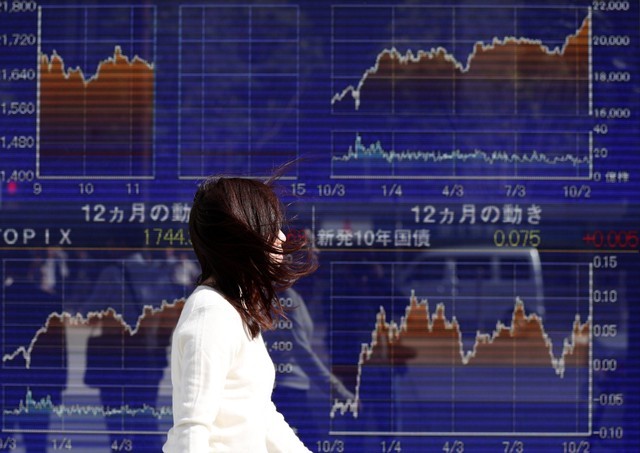By Trevor Hunnicutt and Hideyuki Sano
NEW YORK/TOKYO (Reuters) - Japan is shaking off currency gains that typically punish its stocks, enticing foreign investors including Goldman Sachs Group Inc (NYSE:GS) and BlackRock Inc (NYSE:BLK), which are pumping billions of dollars into the country's equities.
The Nikkei index rose to its highest levels since 1996 despite the yen's near-3 percent gain, returning 17 percent this year, or 20 percent in U.S. dollar terms, including dividends. Typically, a stronger yen hurts stocks in the export powerhouse.
Foreign investors, who largely shunned Japanese stocks on doubts rising corporate earnings would be sustained, bought 4.4 trillion yen ($39 billion) of Japanese stocks and futures during the past six weeks, according to the Tokyo Stock Exchange. Foreign investors sold 2.4 trillion yen ($21 billion) from mid-July to early September at the height of fears over a confrontation with North Korea.
Yet the market still looks attractive to foreign investors as strong domestic demand has helped drive Japanese gross domestic product to an annualized 2.5 percent in the second quarter, its sixth straight quarter of expansion.
"It's probably the cheapest developed market out there - maybe the only cheap developed market out there," said Russ Koesterich, a manager of the $39 billion BlackRock Global Allocation Fund, which raised its Japanese stock exposure in recent months. At the end of September, Global Allocation held 8.6 percent of its assets in Japanese equities, up from 7.8 percent the month prior, according to disclosures on the fund's website.
The ratio of stock prices to earnings expected over the next 12 months is 18.6 in the United States, compared to 15.4 in Japan, Thomson Reuters data shows.
There are good reasons for the discount, including stubbornly low inflation, a heavy debt load and an aging population, said Koesterich.
The Bank of Japan (BOJ) aggressively tried to jumpstart its economy over the last several years, buying domestic stock exchange-traded funds (ETF) at a pace of 6 trillion yen ($53 billion) per year. On Tuesday BOJ Governor Haruhiko Kuroda signaled the chance of slowing ETF buying before embarking on a full-fledged withdrawal of stimulus.
The market is dodging that risk for now. This year Japanese stocks have become statistically less likely to sell off when the yen rises, but they still gain when the yen weakens, according to an analysis by brokerage firm Macro Risk Advisors LLC.
"Exports are becoming less influenced by the yen," said Hiroshi Watanabe, economist at Sony Financial Holdings Inc. "At the moment, there is a strong demand for digital products and many Japanese products are competitive in quality and performance rather than in price."
Japan's exports rose at the fastest pace in nearly four years in August. The pace decelerated in September, though economists regard the slowdown as temporary. Meanwhile, Japan's retail sales rose in September at the fastest pace in three months.
David Rosenberg, Gluskin Sheff + Associates Inc's chief economist, said in a note that "a 25-year secular downtrend has recently been broken" in Japan. He argued the disconnect between stocks and the yen is confirmation that the market is trading on corporate fundamentals rather than currency speculation, with a fall in unemployment and rising domestic demand aiding small-cap companies.
However, corporate governance remains a concern to some investors following major scandals. Kobe Steel Ltd, Japan's third-largest steelmaker, earlier this month said data on the quality of some of its products was fabricated.
Katie Koch, Global Head of Client Portfolio Management and Business Strategy at Goldman Sachs Asset Management, said the Japanese economy nonetheless may be developing competitive advantages and that corporate reforms on issues like executive compensation are becoming more widespread.
The fund manager's Japan-focused holdings include Nidec Corp, which has gained 55 percent this year, and Pola Orbis Holdings Inc, up 52 percent.
Nidec makes small motors that power electric vehicles, a growing market, while Pola Orbis' cosmetics draw consumers from China's expanding middle class.
Automation is attracting other investors into Japanese markets. Two U.S.-listed robotics ETFs - Global X Robotics & Artificial Intelligence ETF and ROBO Global Robotics and Automation Index ETF - are heavily invested in Japanese stocks, such as Fanuc Corp.

That manufacturer helps factories automate production and is up more than 38 percent this year, while the two robotics ETFs have pulled in $2.1 billion, according to Thomson Reuters' Lipper research unit.